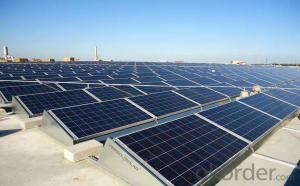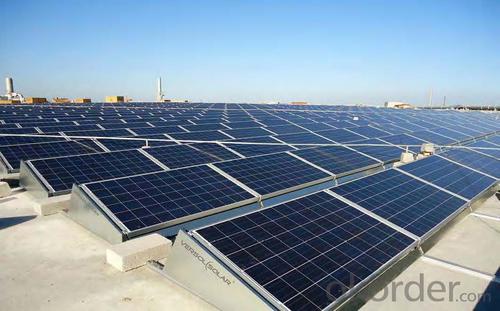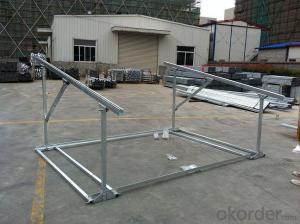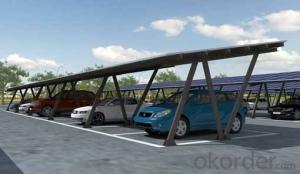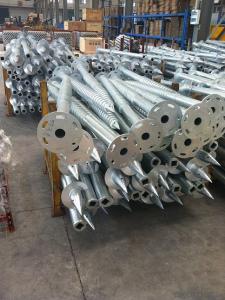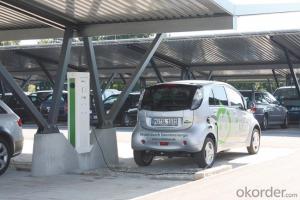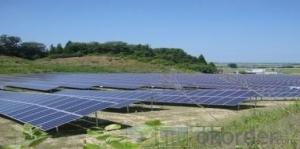Wind Water Solar Energy Systems Windstream System Solar Mounting System
- Loading Port:
- China Main Port
- Payment Terms:
- TT OR LC
- Min Order Qty:
- -
- Supply Capability:
- -
OKorder Service Pledge
Quality Product, Order Online Tracking, Timely Delivery
OKorder Financial Service
Credit Rating, Credit Services, Credit Purchasing
You Might Also Like
Project site Flat roof
Module specification All modules with frame
Installation inclination 10° -15°
Module arrangement Portrait
Module area square Client arrangement
Module area position Client arrangement
Bottom frame AL 6063T5
Supporting leg Stainless steel
Deflector Zinc plated Al-Ma board or stainless steel
Small piece Stainless steel, Al 6063T5
Bottom pieces No mechanical connection, system fixation depend on self-
weight and air flow pressure.
- Q: How do solar energy systems impact the resale value of a home?
- The installation of solar energy systems in homes can greatly benefit their resale value. Numerous studies have revealed that homes equipped with solar panels tend to sell at a faster pace and for a higher price compared to homes without solar energy systems. This is primarily due to the fact that solar panels provide potential buyers with significant long-term savings on their energy expenses. One of the major advantages of solar energy systems lies in their ability to generate electricity from a sustainable source, thereby reducing the dependence on traditional fossil fuels. This not only benefits the environment but also results in cost savings through reduced energy bills. Prospective buyers are often drawn to homes with solar panels as they recognize the long-term financial advantages of owning a property that generates its own electricity. Furthermore, numerous countries and states offer a variety of incentives and tax credits to homeowners who choose to install solar panels. These financial benefits further enhance the attractiveness of homes equipped with solar energy systems, as buyers may be able to take advantage of these incentives themselves. Additionally, solar energy systems are known to enhance the energy efficiency of homes. By harnessing the sun's energy, homeowners can significantly reduce their reliance on the power grid, leading to a decrease in overall energy consumption. In today's market, energy-efficient homes are highly sought after, as they not only lower utility costs but also contribute to a more environmentally friendly and sustainable future. However, it is important to note that the impact of solar energy systems on the resale value of a home may vary depending on factors such as location, size, and efficiency of the system. Therefore, it is advisable to consult with local real estate professionals or appraisers to obtain a more accurate understanding of the specific impact on resale value in a particular area. In conclusion, the installation of solar energy systems can positively affect the resale value of homes by reducing energy bills, providing long-term cost savings, and improving overall energy efficiency. As sustainability and renewable energy become increasingly important, homes equipped with solar panels are becoming more appealing to potential buyers, resulting in faster sales and higher selling prices.
- Q: Are there any disadvantages of solar energy systems?
- While solar energy systems have numerous advantages, they also come with a few disadvantages. One of the main drawbacks is the high initial cost of installation. The upfront expenses associated with purchasing and installing solar panels can be quite substantial, making it unaffordable for some individuals or businesses. Additionally, the efficiency of solar panels is affected by external factors such as weather conditions, shading, and the angle of the panels, which can limit their effectiveness in certain locations. Another disadvantage is the intermittent nature of solar power, as it can only be generated during daylight hours and is not available during cloudy or nighttime conditions. This requires the installation of expensive battery systems for energy storage or reliance on the grid during non-generating periods. Lastly, the production of solar panels requires the use of certain materials, some of which are non-renewable and may have negative environmental impacts during extraction and manufacturing processes. Despite these disadvantages, advancements in technology and decreasing costs are continually improving the efficiency and affordability of solar energy systems.
- Q: Can solar energy systems be installed on military bases or installations?
- Yes, solar energy systems can be installed on military bases or installations. In fact, many military bases across the world have already embraced solar power as a clean and sustainable energy source. These installations not only reduce reliance on traditional fossil fuels but also enhance energy security and resilience for critical operations. Additionally, solar energy systems on military bases can contribute to cost savings, environmental stewardship, and serve as an example for the broader community.
- Q: Can solar energy systems be used for commercial purposes?
- Yes, solar energy systems can definitely be used for commercial purposes. In fact, many businesses and industries around the world are increasingly adopting solar power as a reliable and sustainable source of energy. Commercial solar energy systems can help reduce electricity bills, lower operating costs, and contribute to a company's environmental responsibility. Additionally, various financial incentives and tax benefits are available to businesses that choose to invest in solar energy, making it a viable and economically beneficial option for commercial purposes.
- Q: What is the impact of temperature on the performance of solar panels?
- Solar panel performance is primarily negatively impacted by temperature, although there are factors that can lessen these effects. Generally, as temperature rises, solar panel efficiency decreases. This is due to the semiconductors in the panels becoming less effective at converting sunlight into electricity as they heat up. One of the main reasons for this efficiency decrease is the correlation between temperature and solar panel voltage output. As temperature increases, voltage output decreases, resulting in a reduction in power output. This phenomenon is referred to as the solar panel's temperature coefficient, which varies depending on the panel's type and quality. Moreover, increased temperature can cause thermal expansion and contraction, placing stress on the electrical connections and components within the panel. This can lead to the panel's performance degradation over time. Nevertheless, it is important to note that not all aspects of solar panel performance are negatively impacted by temperature. In fact, higher temperatures can enhance the conductivity of the electrical connections, potentially improving the panel's overall performance. Additionally, some panels are designed with cooling mechanisms, such as air or water circulation, to maintain their temperature and mitigate the negative effects. In conclusion, temperature predominantly has a negative impact on solar panel performance, resulting in reduced efficiency and power output. However, with appropriate design and cooling mechanisms, these effects can be mitigated to some extent, enabling solar panels to continue generating electricity even in high-temperature environments.
- Q: Can a solar energy system be installed in areas with extreme weather conditions?
- Yes, a solar energy system can be installed in areas with extreme weather conditions. Solar energy systems are designed to withstand a wide range of weather conditions, including extreme cold, heat, wind, rain, and snow. In fact, solar panels are commonly used in various regions with extreme weather conditions, such as deserts, arctic regions, and coastal areas. To ensure the durability and efficiency of the system, solar panels are built with high-quality materials that can withstand harsh weather conditions. They are designed to be impact-resistant and are tested to withstand hail, strong winds, and heavy snow loads. Additionally, the frames and mounting systems used for solar panels are engineered to provide stability and protection against extreme weather events. In extreme cold weather conditions, solar energy systems can still function efficiently, although their performance may be slightly reduced due to lower temperatures. Solar panels are designed to absorb sunlight, which allows them to generate electricity even in low-light conditions. In snowy regions, solar panels are typically installed at an angle to facilitate snow shedding and prevent snow buildup that could reduce their efficiency. In areas with extreme heat, solar energy systems can still operate effectively, although the efficiency of the panels may be slightly reduced due to increased temperatures. However, modern solar panels are designed with heat dissipation features to minimize any performance losses caused by high temperatures. Overall, solar energy systems are highly adaptable and can be installed in areas with extreme weather conditions. They are designed to withstand a wide range of weather elements and continue to generate clean and renewable energy even in challenging environments.
- Q: Can solar energy systems be used in areas with high seismic activity?
- Yes, solar energy systems can be used in areas with high seismic activity. However, it is essential to design and install these systems with seismic-resistant features in mind to ensure their structural integrity during earthquakes. Reinforcing the mounting structures, using flexible connectors, and implementing proper anchoring techniques can help mitigate potential risks. Additionally, regular inspections and maintenance are crucial to ensure the ongoing safety and functionality of solar energy systems in seismic-prone regions.
- Q: Can solar energy systems be used for powering air conditioning systems?
- Solar energy systems have the capability to power air conditioning systems. Known as solar air conditioners, these systems make use of the sun's energy to operate the cooling process. They are usually comprised of solar panels that capture sunlight and transform it into electricity. This electricity is then utilized to run the air conditioning unit. By utilizing solar energy, these systems present a sustainable and eco-friendly option to traditional air conditioning systems, which rely on fossil fuels. Solar air conditioners are especially advantageous in regions with ample sunlight, as they can substantially decrease energy expenses and reliance on the electrical grid.
- Q: Can a solar energy system be used in areas prone to hurricanes or tornadoes?
- Yes, a solar energy system can be used in areas prone to hurricanes or tornadoes. While it is true that these natural disasters can cause damage to solar panels and other components of the system, proper planning and installation can mitigate the risks. One key consideration is the design and structural integrity of the solar panels themselves. High-quality solar panels are built to withstand strong winds and extreme weather conditions. They are usually tested and certified to meet specific standards, including wind resistance ratings. In areas prone to hurricanes or tornadoes, it is important to install solar panels that are specifically designed to withstand the potential wind speeds and impacts associated with these events. Additionally, proper installation techniques can enhance the resilience of a solar energy system. For example, using reinforced mounting structures, securing panels with additional brackets or fasteners, and ensuring secure connections between panels, inverters, and batteries can help prevent damage caused by strong winds or flying debris. In some cases, homeowners may also choose to invest in solar panel tracking systems that allow the panels to automatically adjust their position to reduce wind resistance during extreme weather events. This feature can help protect the panels and increase their chances of surviving a hurricane or tornado with minimal damage. Furthermore, it is essential to have a backup power storage system in place, such as batteries, to ensure continuous power supply during and after a severe weather event. This backup system can store excess energy generated by the solar panels, allowing the system to operate independently of the grid during power outages caused by hurricanes or tornadoes. Overall, while there are risks associated with using a solar energy system in areas prone to hurricanes or tornadoes, careful planning, proper installation, and the use of resilient components can make it possible to harness solar power even in these challenging environments.
- Q: Can solar energy systems be connected to the grid?
- Yes, solar energy systems can be connected to the grid. This connection allows excess electricity generated by the solar panels to be sent back to the grid, earning credits or compensation for the owner while also providing clean energy to the grid for others to use.
Send your message to us
Wind Water Solar Energy Systems Windstream System Solar Mounting System
- Loading Port:
- China Main Port
- Payment Terms:
- TT OR LC
- Min Order Qty:
- -
- Supply Capability:
- -
OKorder Service Pledge
Quality Product, Order Online Tracking, Timely Delivery
OKorder Financial Service
Credit Rating, Credit Services, Credit Purchasing
Similar products
Hot products
Hot Searches
Related keywords
